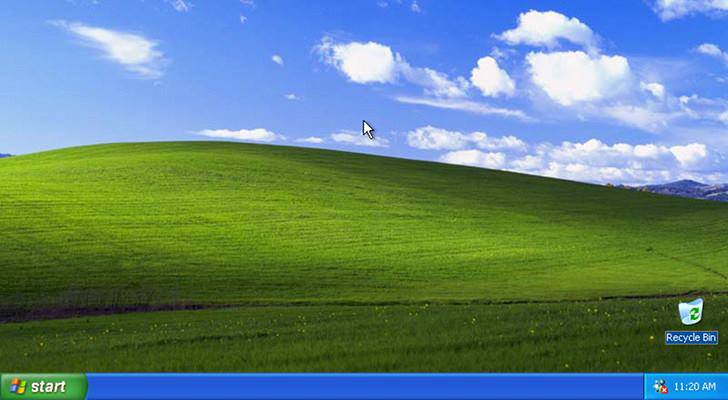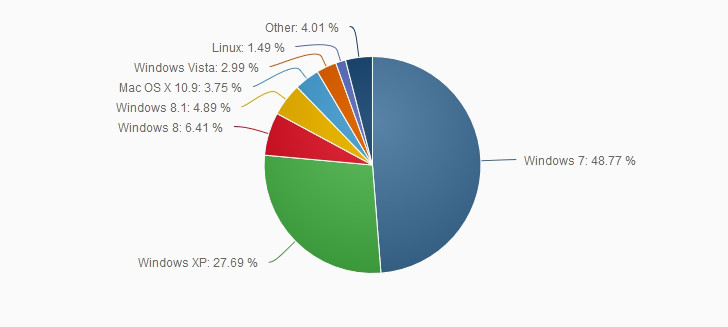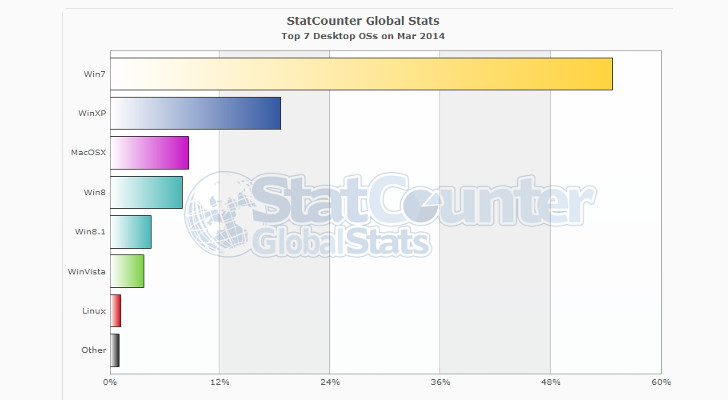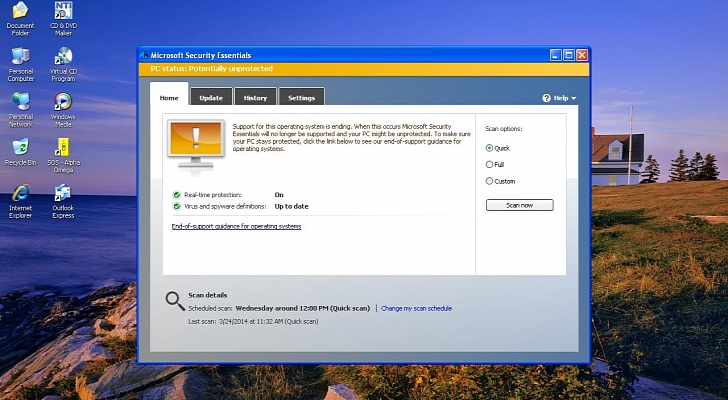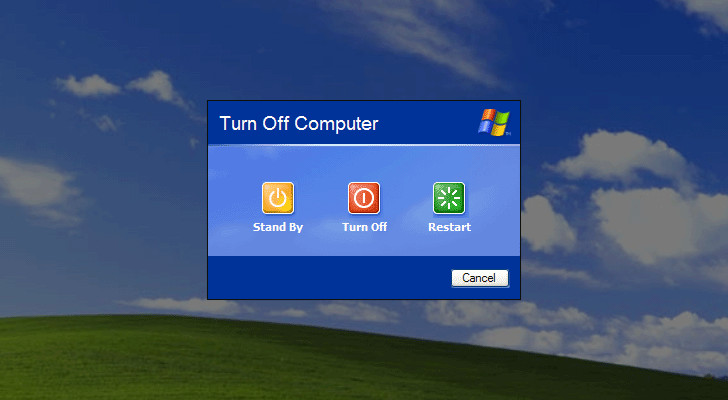The time has come and Microsoft finally decided to pull the plug on Windows XP and despite the fact that so many users are still running it, the company will no longer release any other updates or security patches.
This means that despite the 28 percent market share of Windows XP right now, the Redmond-based software giant will completely abandon it, so you basically have no other option than to upgrade or become vulnerable to attacks.
Windows XP, however, gets retired after no less than 12 years on the market, even though Microsoft usually retires its operating system after only 10 years. The company was more or less forced to extend Windows XP support because of the big market share of the operating system, but despite this, it now seems ready to kill the platform once and for ever.
HOW IT CAME TO BE
We’re not going to present you the full history of Windows XP, because it’s fairly easy to find this on Wikipedia or even on Microsoft’s website, but we do need to mention that work on this very successful project started during the 1990s, as Microsoft wanted to develop an operating system for the consumer market. An improved version of Windows 2000 was supposed to tackle the business side of the industry, so Windows XP was only supposed to be aimed at the consumer.
The Redmond-based software giant, however, changed its mind in January 2000 and discontinued plans for the two separate platforms and instead started work on the so-called “Whistler,” a single operating system aimed at every industry sector, including consumers and businesses.
Windows XP reached RTM on August 24, 2001 and quickly received positive feedback, as most users were impressed with the interface, the stability and performance of the new operating system. The public launch took place on October 25 during the same year.
Both Windows XP Home and Professional versions experienced record sales, even though several other editions have been launched after that. In January 2006, Microsoft confirmed that it sold over 400 million Windows XP licenses, which was the clear indication that it was the most popular Windows version ever.
Still, the arrival of newer Windows versions moved people off Windows XP and on June 30, 2008, the company decided to stop selling the operating system it launched in 2001.
Read more: Windows XP news, comments, and expert advices
Microsoft also rolled out several service packs for Windows XP, all of them comprising critical updates that were supposed to improve the overall performance of the operating system and fix a number of issues. They also brought new features, such as USB 2.0 and .NET Framework support.
Windows XP Service pack 1 was launched on September 9, 2002, while the second service pack arrived on August 25, 2004. The third and the final Windows XP service pack was launch to users on May 6, 2008.
This is what the location where the Bliss wallpaper of Windows XP looks like today.Microsoft launched Windows XP with much fanfare and Bill Gates himself, at that point chairman and chief software architect, praised the operating system for bringing so many great features and an eye-candy interface. It was promoted as “the new Windows for home and work,” with a design that “will bring a simple, colorful and clean look to the desktop” (you can find the original press release launched by Microsoft in 2001 right after the jump).SYSTEM REQUIREMENTS
Windows XP was an operating system that worked like a charm on old computers, so it’s no surprise that so many users are actually refusing to upgrade like now. Here are the system requirements of each version:
Windows XP Home and Professional
• CPU: Pentium or compatible chip with at least 233 MHz • Memory: 64 MB • Hard drive: 1.5 GB of storage space • Media: CD-ROM Drive • Display: Super VGA with a resolution of 800x600 • No audio card required • Input devices: keyboard and mouse
Windows XP Professional x64 Edition
• CPU: 64-bit processor • Memory: 256 MB • Hard drive: 1.5 GB of storage space • Media: CD-ROM Drive • Display: Super VGA with a resolution of 800x600 • No audio card required • Input devices: keyboard and mouse
Windows XP also had some physical memory limits, so if you were using the Starter Edition, you couldn’t install more than 512 MB of RAM. The Home, Media Center, Tablet PC, and Professional builds could cope with as much as 4 GB of RAM, while Professional x64 and Professional 64-bit worked with even 128 GB.
MARKET SHARE
Microsoft has tried for years to get users off Windows XP, but the operating system launched 12 years ago still powers more than 28 percent of the desktop computers worldwide. At least, that’s what third-party researchers across the world are claiming.
Net Applications says that Windows XP is currently installed on 27.69 percent of the desktop computers worldwide, which makes it the second most-used operating system after Windows 7, which is the obvious leader with 48.77 percent. Windows 8 is third with 6.41 percent, followed by 8.1 with 4.89 percent.
If you’re asking the guys at StatCounter, Windows XP currently has a market share of 18.61 percent, while Windows 7 claims the leading spot with 54.68 percent (which means that one in two desktop computers is powered by Windows 7). This time, Windows 8 has a market share of 7.85 percent, while 8.1 comes next with 4.48 percent.
As far as gamers are concerned, Windows XP continues to work pretty smoothly on their computers. Steam data shows that Windows XP 32-bit is powering 5.63 percent of the PCs also running Valve’s gaming platform, while the 64-bit version drops to only 0.30 percent.
WHAT END OF SUPPORT REALLY MEANS
Without support, Windows XP is pretty much a vulnerable operating system that can’t be fixed once something is broken. This means that cybercriminals could easily hack a machine running Windows XP and thus access users’ data freely, as Microsoft will no longer be there to provide assistance.
Microsoft has started showing upgrade notifications right on the desktop via Security Essentials.Security experts are warning that some hackers might already hold some exploits developed to take advantage of Windows XP security flaws, but they’re keeping it away until April 8, just to make sure that Microsoft won’t be able to fix them.Redmond itself is warning that without support, your Windows XP computer will be quite easy to hack.
“If you continue to use Windows XP after support ends, your computer will still work but it might become more vulnerable to security risks and viruses. Also, as more software and hardware manufacturers continue to optimize for more recent versions of Windows, you can expect to encounter greater numbers of apps and devices that do not work with Windows XP.” Read more: Kaspersky recommends users to upgrade ASAP
Windows XP, however, will continue to work just like before, but in case something goes wrong, there’s nothing you can do about it.
Security apps will also continue to provide support for Windows XP, so it should be quite easy to find an application that will still be able to protect your Windows XP computer. Microsoft will also remove download links for Security Essentials for XP, but existing installations will continue to receive virus definition updates until mid-2015.
WHAT SECURITY EXPERTS ARE SAYING
Even though most security apps worldwide have been updated to keep supporting Windows XP after April 8, most security apps have warned that users still need to upgrade to a newer OS in order to remain completely secure. Here are a few statements released by security gurus across the world:
“Will your anti-virus software protect you? Certainly it will provide protection. But this only holds good if by 'anti-virus' we mean a comprehensive Internet security product that makes use of proactive technology to defend against new, unknown threats - in particular, functionality to prevent the use of exploits. A basic anti-virus product, based largely on signature-based scanning for known malware, is insufficient. Remember too that, as times goes by, security vendors will implement new protection technologies that may well not be Windows XP-compatible.” – David Emm, Kaspersky Lab Expert
“Customers need to know that in addition to running the most up-to-date security products, another important aspect of protecting their systems is keeping them current with the latest OS service pack and patches. Symantec strongly recommends Windows XP customers to upgrade to a more current OS as soon as possible.” – Symantec spokesperson
“[Using Windows XP after end of support is] like driving down the motorway with [your] seatbelt on and then suddenly taking it off. You might have a crash, you might not, but you have seriously increased your risk [if you do].” – Will Markham, security practice lead at Colt
Read more: Anti-virus solutions working on Windows XP after end of support
“Windows XP is like expired milk. If you drink it one day after it expires, you're OK. But after a month, the risk is exponentially greater.” – Sergio Galindo, general manager of GFI Software
“Accelerate your plans to switch from Windows XP to a more modern operating system as soon as possible. After April 2014, Microsoft won’t be issuing any more security fixes for the platform – so you’re potentially sitting on a time bomb.” – Graham Cluley
“Those operating systems and the Office suite will then start to accumulate unfixed vulnerabilities and become a magnet for attackers who will have access to easy-to-use and surefire tools to exploit setups that run on XP/2003 or that have Office 2003.” – Wolfgang Kandek, CTO of Qualys
Computers still running Windows XP will no longer receive updates, so users are recommended to isolate them.WHAT USERS ARE SAYINGUsers, on the other hand, have mixed opinions on Windows XP’s end of support, but their comments pretty much depend on the operating system that they are currently running at this point. Here are a few comments posted by our readers in the last few days:
“People need to move on. XP is outdated. Why the big to-do about XP? No one makes any fuss about iOS changes or Android or any of the Linux distros.” – Jack Mierda
“I am 82 years old… I don’t think I am ready to learn another version of Windows. I have had 4 or 5 different pc with XP. My first was windows 98. I think it is unfair of Microsoft to change something that works so well and is easy enough for all ages to grasp.” – ray_boggs
“Individuals may like or hate XP but most businesses love it simply because it was consistent and dependable. The biggest line I've heard defending Win 8 has been ‘you're old and afraid to learn something new.’ But new in the business world means it costs money and not just the price of the upgrade. That's why much of the business world still hasn't upgraded and why there would still be a demand for a new XP...or continued support for the original.” – Earl
Read more: Users not afraid despite Microsoft's scaring tactics
“I use XP on one laptop. I'd have upgraded to 8 already if the hardware could handle it, but alas, it cannot. So I'll just have to put it out to pasture. Or I might just keep using it for email, surfing, etc., and leave nothing sensitive on it.” – Drake
“If Win XP is such a dated and irrelevant OS, why are so many large corporations and businesses still exclusively using it on their workstations and laptops? I think this is just a cash grab for MS and the computer industry, ‘Buy a new Windows PC for safety and security’. What a load of garbage and just like MS to force consumers to buy something when what they have is doing just fine for them and upgrading is not necessary.” – Super User
CLOSING WORDS
In the end, believe it or not, but starting tomorrow, Windows XP should no longer exist. There’s no doubt that users will continue to run it for a bit longer, especially on older computers, but without security patches and updates, more and more users would at some point device to migrate to a newer operating system.
In the end, Microsoft is just a business that needs to remain profitable, so if users do not purchase new computers and get new Windows versions, the company can no longer exist.
Killing Windows XP is part of Microsoft’s mission to ensure long-term profitability and keeping an outdated operating system to the market, which basically doesn’t make any money, is clearly against its own principles. If you decide to move to Windows 8.1, on the other hand, Microsoft would be more than happy to provide assistance, and it’s even offering some discounts for computers running the modern platform.
Unfortunately, Windows XP’s time has arrived. We’re going to end the article with a commercial starring none other than Steve Ballmer, the former Microsoft CEO who had his very own way to sell Windows XP and promote its true capabilities.
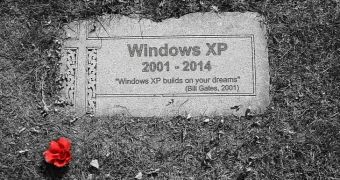
 14 DAY TRIAL //
14 DAY TRIAL // 